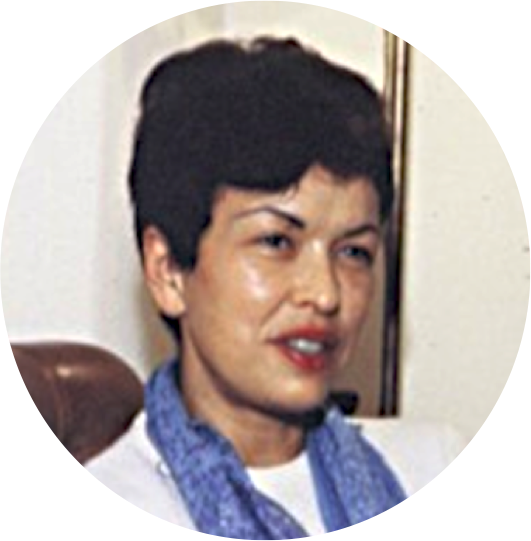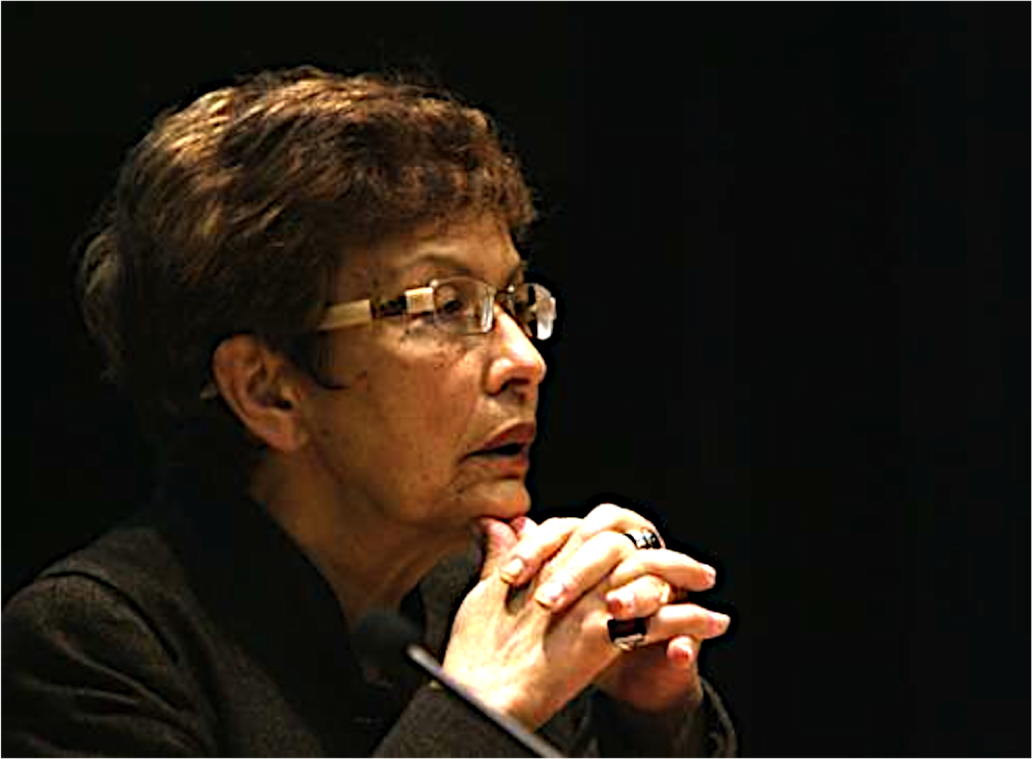

Born in Brazil, Maria Lúcia Lepecki adopted Portugal as her homeland. She studied in Paris, as a scholarship recipient of the Calouste Gulbenkian Foundation, and eventually became a Professor at the Faculty of Letters of the University of Lisbon. She was a founder of the Center of Literatures of Portuguese Expression of the Universities of Lisbon.
An Evocation Maria Lúcia Lepecki (1940-2011):
Writer, researcher, essayist, literary critic, teacher.
Beatriz Weigert
Maria Lúcia Lepecki, a Professor at the University of Lisbon, distinguished herself as an active voice within various cultural areas of the Portuguese language. Her thoughts and writings are disseminated through editorial outlets of the written and spoken press, including published books and periodicals, as well as recordings of radio and television shows.
Born in Araxá, a city located in the state of Minas Gerais, Brazil, on the 27th of February of 1940, she would pursue her academic studies in Belo Horizonte (the state´s capital), having graduated there in Neolatin Letters, from the Federal University of Minas Gerais, the same institute where she obtained her PhD, in 1967, and her Free Lecturing license, in 1969. Later, she would move to Europe, in order to conduct research, primarily related to Portuguese Literature, at the Sorbonne University and at the École Pratique de Hautes Études, both located in Paris. In Lisbon, she performed internships as a scholarship recipient of the Calouste Gulbenkian Foundation.
Within the scope of her area of expertise – Modern and Contemporary Portuguese Literature and Literary Theory -, Lepecki lectured at the University of Lisbon, between 1970 and 2008, and at other European institutions, such as the Utrecht, Leuven and Paris III universities, where she also guided PhD theses. As an international conference speaker, she performed, in successive years, functions of invited Professor at the Universities of Brown, Paris IV, Oxford and Nottingham. Moreover, in harmony with the Center for Lusophone and European Literatures of the University of Lisbon - where she assumed the position of Director, having been responsible for coordinating research guidelines -, Lepecki collaborated with the School for the Formation of Secondary School Teachers of Praia, Cape Verde´s capital city. In this former Portuguese colony, she became co-responsible for creating a course entitled Cape-Verdean and Portuguese Studies, which turned out to be an embryo of the University of Cape Verde.
In parallel to her consecrated academic career, she also stood out in the periodical press by maintaining a column of Literary Criticism at the Diário de Notícias newspaper, by participating in the Colóquio-Letras magazine, and by collaborating with several other Portuguese and foreign newspapers and magazines. Among these, one can include Seara Nova, Silex, Diário Popular, Diário de Lisboa, África, Jornal de Letras, Expresso and A Capital (regarding the Portuguese publications); The Literary Supplement of Minas Gerais, The Literary Supplement of Estado de São Paulo, Vozes and Jornal de Letras (concerning the ones published in Brazil), Sillages (based in Poitiers, France), as well as Voz di Povo and Fragmentos (based in Cape Verde). From 1998 to 2011, she ran a page entitled “The Intimate Life of Words” in the Super Interessante magazine.
Lepecki´s cultural interventions in Portuguese radio and television shows also stand out, particularly as an interviewer for the Antena 2 radio station and as the presenter of the female magazine show Frou-Frou, aired in 1995 by the public television channel RTP, and the feature program Travessa do Cotovelo, broadcasted in 2006 by the same network´s second channel.
Additionally, Lepecki became a member of the International Association of Literary Critics and of the Association of Classical Studies of Brazil, integrated the Executive Direction of the Portuguese Association of Writers, between 1975 and 1977, and assumed the position of Vice-President of the International Association of Lusitanists (based in Paris), from 1984 to 1986, as well as of President of the Association of Teachers of the Portuguese Language, between 1986 and 1988.
In 1977, she was awarded the National Critics´ Prize by the Cultural Foundation of the Federal District of Brasília, Brazil, for the essay Autran Dourado: Uma Leitura Mítica. In 2000, she was honored by the President of the Portuguese Republic, who appointed her commander of the Order of Saint James of the Sword. In 2004, the Portuguese Association of Writers bestowed her with the Literary Essay Great Prize for the work Uma Questão de Ouvido: Ensaios de Retórica e de Interpretação.
Upon Lepecki´s passing, on the 24th of July of 2011, several teaching institutions and personalities connected with the field of the Letters paid their respects and expressed the greatest admiration for her relentless and invaluable dedication to the values of the Portuguese language.
*****
Brasileira de nascimento, Maria Lúcia Lepecki adoptou Portugal como país de residência. Estudou em Paris, como bolseira da Fundação Calouste Gulbenkian e foi Professora Catedrática na Faculdade de Letras da Universidade de Lisboa. Foi fundadora do Centro de Literaturas de Expressão Portuguesa das Universidades de Lisboa.
Evocação de Maria Lúcia Lepecki (1940-2011):
Escritora, investigadora, ensaísta, crítica literária, professora.
Beatriz Weigert
Maria Lúcia Lepecki, professora catedrática da Universidade de Lisboa, distingue-se como voz atuante em várias áreas da cultura da Língua Portuguesa. Sua palavra veicula-se em modalidades editoriais da imprensa escrita e falada, contando-se a publicação em livros e periódicos, gravação de programas radiofónicos e televisivos.
Nascida em Araxá, Minas Gerais, a 27 de Fevereiro de 1940, é em Belo Horizonte que faz sua formação académica, licenciando-se em Letras Neolatinas na Universidade Federal de Minas Gerais, ali obtendo o Doutoramento (1967) e a Livre Docência (1969). Realiza pesquisas, principalmente relacionadas com a Literatura Portuguesa, na Sorbonne e na École Pratique de Hautes Études. Em Lisboa, faz estágios como bolseira da Fundação Calouste Gulbenkian.
Sua área, constituindo-se Literatura Portuguesa Moderna e Contemporânea e Teoria Literária, leciona na Universidade de Lisboa (1970-2008) e em Universidades estrangeiras, de Utreque, Lovaina, Paris III, orientando teses de Doutoramento. Conferencista internacional, é professora convidada, em anos sucessivos, nas Universidades de Brown, Paris IV, Oxford e Nottingham. Colabora com a Escola de Formação de Professores do Ensino Secundário da Cidade da Praia, sendo uma das responsáveis pela criação da licenciatura em Estudos Cabo-verdianos e Portugueses, embrião da Universidade de Cabo Verde. No CLEPUL - Centro de Literaturas de Culturas Lusófonas e Europeias da Universidade de Lisboa, tanto como Diretora, tem a seu cargo a coordenação de linhas de investigação.
Distingue-se na imprensa periódica, mantendo coluna de Crítica Literária no Diário de Notícias, participando na Revista Colóquio-Letras, colaborando em revistas e jornais portugueses e estrangeiros. Entre esses, contam-se Seara Nova, Silex, Diário Popular, Diário de Lisboa, África, Jornal de Letras (Portugal), Expresso, A Capital; Suplemento Literário de Minas Gerais, Suplemento Literário do Estado de São Paulo, Vozes, Jornal de Letras (Brasil), Sillages (Poitiers), Voz di Povo e Fragmentos (Cabo Verde). Na revista Super Interessante, mantém, de 1998 a 2011, a página “A vida íntima das palavras”.
Na programação radiofónica e televisiva, marcam-se suas intervenções culturais, em forma de entrevista (Antena 2) [i], Revista feminina Frou-Frou (1995 - RTP) e a rubrica Travessa do Cotovelo (2006- RTP2) [ii].
Maria Lúcia Lepecki integra-se em entidades associativas e obtém distinções. É membro da Associação Internacional dos Críticos Literários e da Associação de Estudos Clássicos do Brasil. Faz parte da Direção Executiva da Associação Portuguesa de Escritores, no período de 1975 a 1977. É Vice-Presidente da Associação Internacional de Lusitanistas (Paris) de 1984 a1986, e Presidente da Associação de Professores de Português de 1986-1988.
Recebe, em 1977, o Prémio Nacional da Crítica, da Fundação Cultural do Distrito Federal, Brasília, pelo ensaio Autran Dourado: Uma Leitura Mítica. Em 2000, é condecorada, pelo Presidente da República de Portugal, como comendadora da Ordem de Sant’Iago da Espada. Em 2004, é agraciada, pela Associação Portuguesa de Escritores, com o Grande Prémio de Ensaio Literário pelo livro Uma questão de Ouvido: Ensaios de Retórica e de Interpretação.
Ao seu falecimento, ocorrido a 24 de Julho de 2011, publicam-se homenagens votadas à Maria Lúcia, pela dedicação cultivada por ela, aos valores da Língua Portuguesa. Instituições de ensino e personalidades do mundo das letras sinalizam o testemunho de reconhecimento.
[i] Leia-se “Evocação de Maria Lúcia Lepecki”, AB_Óbidos, 08 de Agosto de 2011.
[ii] Correia da Fonseca, “Na vez de ouvir as palavras”: “Vale a regra. E foi de acordo com ela que me tomei espectador assíduo da «Travessa do Cotovelo», rúbrica ainda recente da TV 2, onde a gestão de Maria Lúcia Lepecki desde o início surge como garantia de qualidade”. Jornal, publicação 26.07.2011.

References
- Maria Lepecki, wikipédia.
- WEIGERT, Beatriz, Maria Lúcia Lepecki: Escritora, investigadora, ensaísta, crítica literária, professora, Revista Letras Com Vida – Literatura, Cultura e Arte, N.º 4, 2.º semestre, 2011, pp. 5-8.